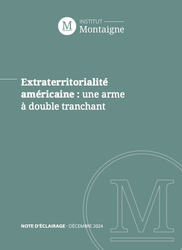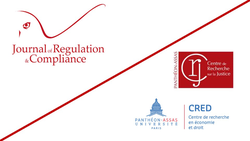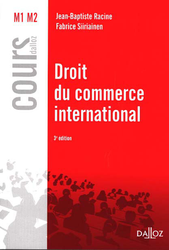Base Documentaire : Doctrine

► Référence complète : M. M. Mohamed Salah, "Conclusions", in J. Andriantsimbazovina (dir.), Puissances privées et droits de l'Homme. Essai d'analyse juridique, Mare Martin, coll. "Horizons européens", 2024, pp. 297-314
____
► Résumé de l'article :
____
🦉Cet article est accessible en texte intégral pour les personnes inscrites aux enseignements de la Professeure Marie-Anne Frison-Roche
________
Base Documentaire
► Référence complète : I. Voulgaris, "Réflexions sur l'approche comparative de la qualification en droit international privé ", in Mélanges en l'honneur de Denis Tallon. D'ici, d'ailleurs : harmonisation et dynamique du droit, Société de législation comparée, 2023, p. 193.
_______
► Résumé de l'article :
Base Documentaire : Doctrine

► Référence complète : L. d'Avout, "Compliance and conflict of laws. International Law of Vigilance-Conformity, based on recent applications in Europe", in M.-A. Frison-Roche (dir.), Compliance Obligation, Journal of Regulation & Compliance (JoRC) et Bruylant, coll. "Compliance & Regulation", à paraître
____
📘consulter une présentation générale de l'ouvrage, Compliance Obligation, dans lequel cet article est publié
____
► Résumé de l'article (fait par l'auteur, traduit par le Journal of Regulation & Compliance - JoRC) : In the absence of constraints derived from the real international law, vigilance-compliance laws themselves determine their scope of application in space. They do so generously, to the extent that they often converge on the same operators and 'overlap' on the world stage. The result is a hybridation of the law applicable to the definition of Compliance Obligations; a law possibly written "with four hands" or more, which is not always harmonious and which exposes unilateral legislators to occasional retouching their work and their applied regulations.
____
🦉Cet article est accessible en texte intégral pour les personnes inscrites aux enseignements de la Professeure Marie-Anne Frison-Roche
________
Base Documentaire : Doctrine
► Référence complète : L. d'Avout, La cohérence mondiale du droit, Cours général de droit international privé, Académie de droit international de La Haye, t.443, 2025, 692 p.
____
Base Documentaire : Doctrine

► Référence complète : B. Haftel, "La façon dont l'impératif de Vigilance s'ajuste aux règles juridiques internationales", in M.-A. Frison-Roche (dir.), L'obligation de Compliance, Journal of Regulation & Compliance (JoRC) et Dalloz, coll. "Régulations & Compliance", 2024, à paraître
____
📕lire une présentation générale de l'ouvrage, L'obligation de Compliance, dans lequel cet article est publié
________
4 septembre 2025
Responsabilités éditoriales : Direction de la collection "Régulations & Compliance", JoRC & Dalloz

🌐suivre Marie-Anne Frison-Roche sur LinkedIn
🌐souscrire à la Newsletter MAFR. Regulation, Compliance, Law
____
► Référence complète : M.-A. Frison-Roche (dir.), L'Obligation de Compliance, coll. "Régulations & Compliance", Journal of Regulation & Compliance (JoRC) et les Éditions Lefebvre - Dalloz, 2025, sous presse.
____
📘Parallèlement, un ouvrage en anglais, Compliance Obligation, est publié dans la collection éditée par le Journal of Regulation & Compliance (JoRC) et les Éditions Bruylant.
____
🧮Cet ouvrage vient à la suite d'un cycle de colloques 2023 organisés par le Journal of Regulation & Compliance (JoRC) et des Universités qui lui sont partenaires.
____
📚Ce volume s'insère dans la lignée des ouvrages qui dans cette collection sont consacrés à la Compliance.
► Lire les présentations des autres ouvrages de la Collection portant sur la Compliance :
- les ouvrages suivants :
🕴️M.-A. Frison-Roche (dir.), 📕Le système probatoire de la Compliance, 2025
🕴️M.-A. Frison-Roche (dir.), 📕Compliance et contrat, 2024
- les ouvrages précédents :
🕴️M.-A. Frison-Roche et M. Boissavy (dir.), 📕Compliance & droits de la défense. Enquête interne - CJIP - CRPC, 2024
🕴️M.-A. Frison-Roche (dir.), 📕La juridictionnalisation de Compliance, 2023
🕴️M.-A. Frison-Roche (dir.), 📕Les Buts Monumentaux de la Compliance, 2022
🕴️M.-A. Frison-Roche (dir.), 📕Les outils de la Compliance, 2021
🕴️M.-A. Frison-Roche (dir.), 📕Pour une Europe de la Compliance, 2019
🕴️N. Borga, 🕴️J.-Cl. Marin et 🕴️J-.Ch. Roda (dir.), 📕Compliance : Entreprise, Régulateur, Juge, 2018
🕴️M.-A. Frison-Roche (dir.), 📕Régulation, Supervision, Compliance, 2017
🕴️M.-A. Frison-Roche (dir.), 📕Internet, espace d'interrégulation, 2016
📚Consulter tous les autres titres de la collection.
___
► Présentation générale de l'ouvrage : La compliance est parfois présentée comme ce à quoi l'on ne peut échapper, ce qui revient donc à y voir l'obligation juridique par excellence, le Droit pénal étant alors son mode d'expression la plus adéquate. Elle est parfois présentée comme ce que l'entreprise entreprise par souci éthique, relevant alors de l'opposé qu'est l'autorégulation. L'on n'a donc pas pour l'instant une vision unitaire de L'Obligation de Compliance. L'on l'a d'autant moins que la multitude de textes, eux-mêmes évoluant et changeant sans cesse, injectent des obligations de compliance si multiples et si diverses que l'on renonce à charge une unité, en se disant qu'au cas par cas, l'on définira un régime et une contrainte juridique plus ou moins forte, visant un assujetti ou un débiteur ou un autre, au bénéfice de l'un ou d'autre.
Cette absence d'unité, du fait de l'absence de définition de L'Obligation de Compliance, rend l'application des textes difficile à prévoir et fait donc craindre le Juge qui pourtant va prendre de plus en plus d'importance.
Par cet ouvrage, qui pose les questions pratiques A quoi oblige la Compliance ? Qui est obligé ?, Jusqu’où est-on obligé ? Qui peut obliger ? et y apporte des réponses, les pratiques, contraintes et innovation de Compliance seront mieux maîtrisées et anticipées par tous ceux qu'elles concernent : les entreprises, les parties prenantes, les techniciens, les juristes, les conseils, les institutions, les juridictions.
____
🏗️Construction générale de l'ouvrage : L'ouvrage s'ouvre sur un article d'Introduction qui, s'appuyant sur le droit positif, porte sur la conception unifiée que l'on peut, voire que l'on doit, avoir de l' "Obligation de Compliance" en ce que les entités obligées par les diverse réglementées soient toujours obligées de construire des "structures de compliance" (ce qui est une obligation de résultat) pour obtenir des uns et des autres des comportements pertinent pour l'obtention de ce que les Législateurs visent (leurs "Buts Monumentaux"), ce qui est le cœur du disponible et constitue pour les entités obligées une obligation de moyens. A cette obligation juridique peut s'adosser des actions qui ne sont pas juridiques, les régimes ne devant pas se confondre.
Le premier Titre de l'ouvrage vise à cerner l'Obligation de Compliance. Pour cela, son Chapitre I porte sur la Nature de cette obligation. Le Chapitre II traite des Espaces de l'obligation de compliance.
Le Titre II vise à articuler l'Obligation de Compliance et des branches du Droit.
Le Titre III de l'ouvrage envisage la manière dont on donne la possibilité d'obliger et dont on se donne les moyens d'obliger. Pour cela, son Chapitre I porte sur la Convergence des Sources de l'Obligation de Compliance. Son Chapitre II envisage l'Arbitrage International comme renfort de l'Obligation de Compliance. Le Chapitre III aborde quant à lui la Médiation, en tant que Voix de la Compliance.
Le dernier Titre de l'ouvrage est consacré à la Vigilance, pointe avancée de l'Obligation de Compliance. Son Chapitre I est consacré à l'étude des différents secteurs, et analyse les Intensités de l'Obligation de Vigilance, Pointe Avancée du Système de Compliance, en leur sein. Le Chapitre II aborde les Variations de Tensions engendrées par l'Obligation de Vigilance, Pointe Avancée du Système de Compliance. Enfin, son Chapitre III traite des Modalités Nouvelles de l'Obligation de Compliance, mises en lumière par l'Impératif de Vigilance.
____
TABLE DES MATIÈRES
ANCRER LES OBLIGATIONS DE COMPLIANCE SI DIVERSES
DANS LEUR NATURE, LEURS RÉGIMES ET LEUR FORCE
POUR DÉGAGER L'UNITÉ DE L'OBLIGATION DE COMPLIANCE
LA RENDANT COMPRÉHENSIBLE ET PRATIQUABLE
♦️ Obligation de Compliance : construire une structure de compliance produisant des effets crédibles au regard des Buts Monumentaux visés par le Législateur, par 🕴️Marie-Anne Frison-Roche
TITRE I.
CERNER L’OBLIGATION DE COMPLIANCE
CHAPITRE I : LA NATURE DE L’OBLIGATION DE COMPLIANCE
Section 1 ♦️ La volonté, le cœur et le calcul, les trois traits cernant l'Obligation de Compliance, par 🕴️Marie-Anne Frison-Roche
Section 2 ♦️ De la dette à l’obligation de compliance, par 🕴️Bruno Deffains
Section 3 ♦️ Obligation de compliance et droits humains, par 🕴️Jean-Baptiste Racine
Section 4 ♦️ L'Obligation de Compliance et les mutations de la souveraineté et de la citoyenneté, par 🕴️René Sève
Section 5 ♦️ La définition de l''obligation de compliance confrontée au droit de la cybersécurité par 🕴️Michel Séjean
CHAPITRE II : LES ESPACES DE L’OBLIGATION DE COMPLIANCE
Section 1 ♦️ Entités industrielles et Obligation de compliance, par 🕴️Etienne Maclouf
Section 2 ♦️ L'Obligation de Compliance dans les chaînes de valeur, par 🕴️Lucien Rapp
Section 3 ♦️ Compliance et conflits de lois. Le droit international de la vigilance-conformité à partir de quelques applications récentes sur le continent européen, par 🕴️Louis d'Avout
TITRE II.
ARTICULER L’OBLIGATION DE COMPLIANCE AVEC DES BRANCHES DU DROIT
Section 1 ♦️ Droit fiscal et obligation de compliance, par 🕴️Daniel Gutmann
Section 2 ♦️ L'obligation processuelle, prototype de l'Obligation de Compliance, par 🕴️Marie-Anne Frison-Roche
Section 3 ♦️ Le droit des sociétés et des marchés financiers face à l'Obligation de Compliance, par 🕴️Anne-Valérie Le Fur
Section 4 ♦️ Transformation de la gouvernance et obligation de vigilance, par 🕴️Véronique Magnier
Section 5 ♦️ La compliance environnementale et climatique, par 🕴️Marta Torre-Schaub
Section 6 ♦️ Obligations de compliance et concurrence : les liaisons dangereuses ?, par 🕴️Jean-Christophe Roda
Section 7 ♦️ L'obligation de compliance en droit global, par 🕴️Benoît Frydman & 🕴️Alice Briegleb
Section 8 ♦️ Les juges du droit des entreprises en difficulté et les obligations de compliance, par 🕴️Jean-Baptiste Barbièri
TITRE III.
COMPLIANCE : DONNER ET SE DONNER LES MOYENS D’OBLIGER
CHAPITRE I : LA CONVERGENCE DES SOURCES
Section 1 ♦️ "Obligation sur Obligation vaut", par 🕴️Marie-Anne Frison-Roche
Section 2 ♦️ Les technologies disponibles, prescrites ou proscrites pour satisfaire Compliance et Vigilance, par 🕴️Emmanuel Netter
Section 3 ♦️ Contrainte légale et stratégie des entreprises en matière de Compliance, par 🕴️Jean-Philippe Denis et 🕴️Nathalie Fabbe-Costes
Section 4 ♦️ La loi, source de l’Obligation de Compliance, par 🕴️Jean-Baptiste Blanc
Section 5 ♦️ Opposition et convergence des systèmes juridiques américains et européens dans les règles et cultures de compliance, par 🕴️Raphaël Gauvain et 🕴️Blanche Balian
Section 6 ♦️ A quoi les engagements engagent, par 🕴️Marie-Anne Frison-Roche
CHAPITRE II : L’ARBITRAGE INTERNATIONAL EN RENFORT DE L’OBLIGATION DE COMPLIANCE
Section 1 ♦️ L'activation par l'arbitrage de l'Obligation de Compliance pour une place d'arbitrage durable, par 🕴️Marie-Anne Frison-Roche
Section 2 ♦️ L’usage de l’arbitrage international pour renforcer l’obligation de Compliance : l’exemple du secteur de la construction, par 🕴️Christophe Lapp
Section 3 ♦️ L’arbitre, juge, superviseur, accompagnateur ?, par 🕴️Jean-Baptiste Racine
Section 4 ♦️ Comment l'arbitrage international peut être un renfort de l'Obligation de Compliance, par 🕴️Laurent Aynès
TITRE IV.
LA VIGILANCE, POINTE AVANCÉE DE L’OBLIGATION DE COMPLIANCE
Section 1 ♦️ La Vigilance, pointe avancée et part totale de l'Obligation de Compliance, par 🕴️Marie-Anne Frison-Roche
CHAPITRE I : LES INTENSITÉS DE L’OBLIGATION DE VIGILANCE, POINTE AVANCÉE DU SYSTÈME DE COMPLIANCE
Section 2 ♦️ L’intensité de l’Obligation de Vigilance selon les secteurs : le cas des opérateurs financiers, par 🕴️Anne-Claire Rouaud
Section 3 ♦️ L’intensité du devoir de vigilance dans le secteur bancaire, par 🕴️Mathieu Françon
Section 4 ♦️ L’intensité de l’obligation de vigilance selon les secteurs : le cas des opérateurs numériques, par 🕴️Grégoire Loiseau
Section 5 ♦️ L’obligation de vigilance des opérateurs énergétiques, par 🕴️Marie Lamoureux
CHAPITRE II : LES DISPUTES AUTOUR DE L'OBLIGATION DE VIGILANCE, POINTE AVANCÉE DU SYSTÈME DE COMPLIANCE, DANS SON RAPPORT AVEC LA RESPONSABILITÉ
Section 1 ♦️ Le rapport entre le droit de la responsabilité civile et l'obligation de compliance, par 🕴️Jean-Sébastien Borghetti
Section 2 ♦️ Repenser le concept de responsabilité civile à l’aune du devoir de vigilance, pointe avancée de la compliance, par 🕴️Mustapha Mekki
Section 3 ♦️ Tensions et contradictions entre les instruments relatifs à la vigilance raisonnable des entreprises, par 🕴️Laurence Dubin
Section 4 ♦️ Compliance, Vigilance et Responsabilité civile : mettre en ordre et raison garder, par 🕴️Marie-Anne Frison-Roche
CHAPITRE III : LES MODALITÉS NOUVELLES DE L'OBLIGATION DE COMPLIANCE, MISES EN LUMIÈRE PAR L'IMPÉRATIF DE VIGILANCE
Section 1 ♦️ Clauses et contrats, modalités de l’obligation de vigilance, par 🕴️Gilles J. Martin
Section 2 ♦️ La preuve de la bonne exécution de la Vigilance au regard du système probatoire de Compliance, par 🕴️Jean-Christophe Roda
TITRE V.
LE JUGE ET L'OBLIGATION DE COMPLIANCE
Section 1 ♦️ Devoir de vigilance et litiges commerciaux : une compétence à partager ?, par 🕴️François Ancel
Section 2 ♦️ Les enjeux présents à venir de l’articulation des principes de procédure civile et commerciale avec la logique de compliance, par 🕴️Thibault Goujon-Bethan
Section 3 ♦️ Le juge de l’amiable et la compliance, par 🕴️Malik Chapuis
Section 4 ♦️ Le Juge requis pour une Obligation de Compliance effective, par 🕴️Marie-Anne Frison-Roche
L'OBLIGATION DE COMPLIANCE : VISION D'ENSEMBLE
♦️ L'obligation de compliance, charge portée par les entreprises systémiques donnant vie au Droit de la Compliance. Lignes de force de l'ouvrage L'obligation de compliance (en accès libre) , par 🕴️Marie-Anne Frison-Roche
________
4 septembre 2025
Base Documentaire : Doctrine

► Référence complète : L. d'Avout, "Compliance et conflits de lois. Le droit international de la vigilance-conformité à partir de quelques applications récentes sur le continent européen", in M.-A. Frison-Roche (dir.), L'obligation de Compliance, Journal of Regulation & Compliance (JoRC) et Dalloz, coll. "Régulations & Compliance", 2025, sous presse.
____
📕lire une présentation générale de l'ouvrage, L'obligation de Compliance, dans lequel cet article est publié
____
► Résumé de l'article (fait par l'auteur) : En l’absence de contraintes tirées du vrai droit international, les lois de vigilance-conformité déterminent elles-mêmes leur champ d’application dans l’espace. Elles le font généreusement, au point que, bien souvent, elles convergent sur les mêmes opérateurs et se « superposent » sur la scène mondiale. En résulte une hybridation du droit applicable à la définition des obligations de compliance ; un droit possiblement écrit « à quatre mains » ou plus, qui n’est pas toujours harmonieux et qui expose les législateurs unilatéraux à retoucher ponctuellement leur œuvre, leur règlementation appliquée.
________
🦉Cet article est accessible en texte intégral pour les personnes inscrites aux enseignements de la Professeure Marie-Anne Frison-Roche
________
________
5 décembre 2024
Base Documentaire : Doctrine

► Référence complète : G. Wright & L. Chetcuti, Extraterritorialité américaine : une arme à double tranchant, Institut Montaigne, note d'éclairage, décembre 2024, 76 p.
____
____
📓lire le résumé de la note d'éclairage
____
📓lire la présentation de cette note d'éclairage sur le site de l'Institut Montaigne
____
► Résumé de la note (fait par les auteurs) : "L’extraterritorialité, l’application de lois nationales à l’étranger, s’est fortement développée ces vingt dernières années. Dans un environnement international caractérisé par la compétition stratégique et la faiblesse criante de la diplomatie multilatérale, les États se tournent vers le droit pour défendre leurs intérêts. Les États-Unis en tête.
L’extraterritorialité américaine a de bons et de mauvais usages. Outil essentiel pour faire respecter le droit international et protéger les intérêts américains, elle permet de sanctionner les États hostiles et de combattre la corruption, le blanchiment d’argent, le crime organisé et le terrorisme. Elle a contribué à réduire les prises de risque excessives des entreprises et été utilisée pour tempérer la rivalité sino-américaine. Mais les États-Unis sont aussi accusés de l'utiliser pour renforcer leur position dominante dans de nombreux marchés.
L’extraterritorialité pourrait-elle être la carte maîtresse des États-Unis ? Lors de son premier mandat, Donald Trump a renforcé les contrôles à l’exportation et étendu les lois sanctionnant les violations des droits de l'homme. Parallèlement, il a levé plusieurs réglementations bancaires et tenté de revenir sur plusieurs lois créant selon lui des entraves administratives inutiles. Il a récemment averti qu’il retirerait toute sanction affaiblissant la position dominante du dollar. Une incertitude majeure demeure : dans quelle mesure pourrait-il utiliser l’extraterritorialité comme moyen de pression sur les pays européens?
Quoi qu’il arrive, l’Europe se doit d’être prête. Les entreprises qui ne respectent pas les dispositions américaines risquent de lourdes amendes, la saisie par l’Etat fédéral de données sensibles et l’exclusion du marché américain. Nombre d’entre elles préfèrent se conformer au droit américain plutôt qu’aux mesures européennes destinées à en bloquer l'application. Cela remet directement en question la souveraineté de l’UE et de ses États membres.
Cette note d’éclairage de l’Institut Montaigne offre une analyse approfondie de toutes les dimensions de l’extraterritorialité américaine. Comprendre les tenants et aboutissants de l'extraterritorialité américaine est crucial pour les gouvernements et les entreprises, et devrait faire partie intégrante de l’approche européenne de sécurité économique.".
________
5 décembre 2024
Base Documentaire : Convention, contrat, composition, engagement

► Référence complète : M. Duchâtel & G. Wright, Extraterritorialité chinoise : le nouvel arsenal juridique, Institut Montaigne, note d'éclairage, décembre 2024, 80 p.
____
____
📓lire le résumé de la note d'éclairage
____
📓lire la présentation de cette note d'éclairage sur le site de l'Institut Montaigne
____
► Résumé de la note (fait par les auteurs) : "L’extraterritorialité - l’application de lois nationales à l’étranger -et son utilisation gagnent du terrain. Dans un environnement international caractérisé par la compétition stratégique et la faiblesse criante de la diplomatie multilatérale, les États se tournent vers le droit pour défendre leurs intérêts. C’est le cas de la Chine.
Longtemps associée au "siècle des humiliations" durant lequel les puissances occidentales avaient imposé un régime de privilèges consulaires à la Chine, l’extraterritorialité de la Chine s’est radicalement transformée sous Xi Jinping et poursuit aujourd’hui trois objectifs : se défendre contre les ingérences et sanctions étrangères ; légitimer les actions de politique étrangère dans une quête d’influence mondiale ; et déployer l’agenda de la Chine en matière de sécurité intérieure à l’échelle mondiale.
La Chine explore dans le même temps une approche plus offensive de l’extraterritorialité, en soutien à ses pratiques de coercition économique, pour affirmer sa puissance - bien qu’elle n’en ait pas encore fait usage. Le choix futur d’une utilisation offensive dépendra du calcul des hauts dirigeants du Parti quant aux coûts et aux avantages d’une telle approche en période de tensions internationales ; d’un rôle international plus fort pour le renminbi et d’une exposition globale plus faible au dollar ; et des contre-mesures que les pays tiers pourraient prendre face aux normes extraterritoriales chinoises. Plus la capacité de résistance sera crédible, moins la Chine sera tentée d’y avoir recours.
Il est essentiel que l’UE prenne la mesure de son exposition à l’extraterritorialité chinoise et agisse en conséquence. L’UE devrait démontrer qu’elle est prête à utiliser le levier du déni d’accès au marché unique en cas d’extraterritorialité abusive. C’est la meilleure carte que l’Europe peut jouer dans une perspective dissuasive, tant l’accès au marché européen revêt une importance stratégique pour la Chine.
Cette note d’éclairage de l’Institut Montaigne offre un cadre de compréhension de toutes les dimensions de l’extraterritorialité chinoise. Comprendre les tenants et aboutissants de l'extraterritorialité chinoise est essentiel pour les gouvernements et les entreprises, et devrait faire partie intégrante de l’approche européenne de sécurité économique.".
________
2 décembre 2024
Base Documentaire : Doctrine
► Référence complète : L. d'Avout, "GPA : la première chambre civile couvre la fraude et institue le droit à l'enfant", JCP G, n° 48, 2 décembre 2024, act. 1410, pp. 1974-1978
____
► Résumé de l'article (fait par l'auteur) : "La première chambre civile relance sa jurisprudence en matière de GPA. À travers deux arrêts récents (2 octobre et 14 novembre), elle remet en cause les principes essentiels du droit français de la filiation de la bioéthique, pourtant réaffirmés récemment avec force par le législateur".
____
🦉Cet article est accessible en texte intégral pour les personnes inscrites aux enseignements de la Professeure Marie-Anne Frison-Roche
________
26 novembre 2024
Interviews

🌐suivre Marie-Anne Frison-Roche sur LinkedIn
🌐s'abonner à la Newsletter MAFR Regulation, Compliance, Law
🌐s'abonner à la Newsletter Surplomb, par MAFR
____
► Référence complète : M.-A. Frison-Roche, "GPA : "L’interdiction de la GPA posée par le Code civil n’existe plus", entretien avec Olivia Dufour, Actu-Juridique, 26 novembre 2024
____
____
🌐lire le compte-rendu de l'entretien sur LinkedIn
____
► Présentation de l'entretien par le journal : "Un simple arrêt de section rendu par la première civile de la Cour de cassation le 14 novembre 2024 peut-il donner plein effet à une "pure convention de GPA" ? Telle est la question que l’on peut se poser à la suite de cette décision. Éléments de réponse avec le professeur Marie-Anne Frison-Roche. ".
____
🕴️M.-A. Frison-Roche, 📕GPA : dire Oui ou dire Non, 2018
____
► Questions posées, résumé des réponses apportées :
Actu-Juridique. Question : Un arrêt de section de la première chambre civile de la Cour de cassation rendu le 14 novembre dernier en matière de gestation pour autrui (GPA) a suscité l’émotion. Est-il exact de dire qu’en pratique, suite à cette décision, la prohibition en France de la GPA n’existe plus ?
Marie-Anne Frison-Roche. Réponse. : Oui.
A.J. Q. : Quels étaient les faits de l’espèce et en quoi diffèrent-ils des autres affaires ?
MaFR. R. : En ce que l'adulte à l'égard duquel un lien de filiation est établi n'a aucun lien de filiation biologique et que la technique de l'adoption n'est pas utilisée. Il s'agit donc d'une "convention pure de GPA" dont les demandeurs demandent qu'elle trouve pleine efficacité en droit français.
A.J. Q. : En quoi la technique juridique utilisée pour faire reconnaître cette GPA en France était-elle différente de ce que l’on connait usuellement ?
MaFR. R. : En droit français, il faut (ou il fallait avant cet arrêt de section si sa solution devait perdurer) d'abord établir une filiation à partir d'un lien biologique entre l'enfant et un adulte, puis il est éventuellement possible que ce conjoint de celui-ci adopte cet enfant. Ici la technique utilisée est celle de l'exequatur : hors toute adoption, et tout lien de filiation préalablement établi à partir d'un lien biologique, l'exequatur a été demandé d'un jugement étranger qui avait admis une filiation admise sur la base du seul contrat de mère-porteuse. Le ministère public s'y était opposé car c'est en soi une fraude à la loi française qui interdit ce contrat comme contraire à la dignité des personnes (article 16-7 du Code civil). Mais l'arrêt de section de la première chambre civile du 14 novembre 2024 l'a admis.
A.J. Q. : Quelle est la portée de cet arrêt ?
MaFR. R. : Ia portée est considérable, si la Cour de cassation devait maintenir la solution. En effet, l'arrêt pose qu'il n'est pas contraire à l'ordre public international d'établir une filiation entre des adultes et un enfant né ou à naître sur la seule base d'une convention de mère-porteuse : la filiation par contrat est née. Sans même examiner la réalité du consentement des mères-porteuses, l'on mesure que l'on pourrait donc faire naître des filiations par des contrats.
A.J. Q. : Qu’en est-il du rapport avec l’adoption ?
MaFR. R. : L'adoption est parfois évoquée comme étant un cas où il n'y a pas de rapport entre le parent et l'enfant et qu'il y a donc une similarité. Ce sont deux cas en réalité opposés. L'adoption est le mécanisme légal par lequel l'Etat donne à un enfant né des parents, adultes qui ne peuvent pas choisir l'enfant. Il n'y a pas de contrat. La GPA est ce par quoi des adultes choisissent par avance de faire naître un enfant grâce à un contrat.
A.J. Q. : Le rapporteur n’a-t-il pas évoqué une possibilité de déguiser une adoption illicite à l’étranger sous une GPA ?
MaFR. R. : Oui. C'est à la fois logique et étonnant. En effet, il y a des contrôles dans le mécanisme légal de l'adoption et l'on ne peut choisir l'enfant. C'est pourquoi si l'on veut échapper à ces contraintes, la tentation serait de "déguiser une adoption" en GPA, puisque désormais la GPA est la façon de s'approprier un enfant, prestation que les chaines d'intermédiaires proposent sur le marché mondial des êtres humains à travers le simple mécanisme du contrat et des consentements.
Si cela devait être admis, c'est-à-dire l'interdiction de la GPA édictée par l'article 16-7 du Code civil au titre de l'indisponibilité et de la dignité des personnes, il faudrait que cela soit dit et assumer par une Assemblée plénière.
________
2 octobre 2024
Base Documentaire : 02. Cour de cassation
► Référence complète : Civ. 1, 2 octobre 2024, n° 22-20.883 et 23-50.002
____
🏛️lire l'arrêt rendu à la suite du pourvoi n° 22-20.883
🏛️lire l'arrêt rendu à la suite du pourvoi n° 23-50.002
____
🏛️lire le communiqué de presse de la Cour de cassation accompagnant la publication de ces décisions
____
📝Commentaires de ces décisions :
- JCP G, 14 octobre 2024, n° 41, actualité 1185, p. 1970
________
29 mai 2024
Responsabilités éditoriales : Direction de la collection Compliance & Regulation, JoRC et Bruylant

🌐suivre Marie-Anne Frison-Roche sur LinkedIn
🌐s'abonner à la Newsletter MAFR Regulation, Compliance, Law
____
► Référence complète : M.-A. Frison-Roche (ed.), Compliance Obligation, Journal of Regulation & Compliance (JoRC) et Bruylant, coll. "Compliance & Regulation", à paraître.
____
📕En parallèle, un livre en français, L'Obligation de Compliance, est publié dans la collection "Régulations & Compliance" copubliée par le Journal of Regulation & Compliance (JoRC) et Dalloz.
____
📚Ce livre est partie intégrante de cette collection créée Marie-Anne Frison-Roche pour développer le Droit de la Compliance et de la Régulation.
lire la présentation des autres ouvrages de la collection :
- livres ultérieurs :
🕴️M.A. Frison-Roche (ed.), 📘Le système probatoire de la compliance, 2025
- livres précédents :
🕴️M.A. Frison-Roche (ed), 📘Compliance Juridictionnalisation, 2023
🕴️M.A. Frison-Roche (ed), 📘Compliance Monumental Goals, 2022
🕴️M.-A. Frison-Roche (ed.), 📘Compliance Tools, 2021
____
► voir la présentation générale de cette 📚Series Compliance & Regulation, conçue, fondée et dirigée par Marie-Anne Frison-Roche, copubliée par le Journal of Regulation & Compliance (JoRC) et Bruylant.
____
🧮ce livre suit le cycle de colloques 2023 organisé par le Journal of Regulation & Compliance (JoRC) et ses Universités partenaires.
____
► présentation générale du livre : Compliance is sometimes presented as something that cannot be avoided, which is tantamount to seeing it as the legal obligation par excellence, Criminal Law being its most appropriate mode of expression. However, this is not so evident. Moreover, it is becoming difficult to find a unity to the set of compliance tools, encompassing what refers to a moral representation of the world, or even to the cultures specific to each company, Compliance Law only having to produce incentives or translate this ethical movement. The obligation of compliance is therefore difficult to define.
This difficulty to define affecting the obligation of compliance reflects the uncertainty that still affects Compliance Law in which this obligation develops. Indeed, if we were to limit this branch of law to the obligation to "be conform" with the applicable regulations, the obligation would then be located more in these "regulations", the classical branches of Law which are Contract Law and Tort Law organising "Obligations" paradoxically remaining distant from it. In practice, however, it is on the one hand Liability actions that give life to legal requirements, while companies make themselves responsible through commitments, often unilateral, while contracts multiply, the articulation between legal requirements and corporate and contractual organisations ultimately creating a new way of "governing" not only companies but also what is external to them, so that the Monumental Goals, that Compliance Law substantially aims at, are achieved.
The various Compliance Tools illustrate this spectrum of the Compliance Obligation which varies in its intensity and takes many forms, either as an extension of the classic legal instruments, as in the field of information, or in a more novel way through specific instruments, such as whistleblowing or vigilance. The contract, in that it is by nature an Ex-Ante instrument and not very constrained by borders, can then appear as a natural instrument in the compliance system, as is the Judge who is the guarantor of the proper execution of Contract and Tort laws. The relationship between companies, stakeholders and political authorities is thus renewed.
____
🏗️construction générale du livre
The book opens with a double Introduction. The first, which is freely accessible, is a summary of the book, while the second, which is substantial, deals with the future development of the compliance obligation in a borderless economic system.
The first part is devoted to the definition of the Compliance Obligation.
The second part presents commitments and contracts, in certain new or classic categories, in particular public contracts, and compliance stipulations, analysed and qualified regarding Compliance Law and the various relevant branches of Law.
The third part develops the responsibilities attached to the compliance obligation.
The fourth part refers to the institutions that are responsible for the effectiveness, efficiency, and efficacy of the compliance obligation, including the judge and the international arbitrator.
The fifth part takes the Obligation or Duty of Vigilance as an illustration of all these considerations.
____
TABLE OF CONTENTS
COMPLIANCE OBLIGATION : OVERVIEW
Section 1 ♦️ Main Aspects of the Book Compliance Obligation, by 🕴️Marie-Anne Frison-Roche
Section 2 ♦️ Conceiving the Compliance Obligation: Using its Position to take part in achieving the Compliance Monumental Goals, by 🕴️Marie-Anne Frison-Roche
TITLE I.
IDENTIFYING THE COMPLIANCE OBLIGATION
CHAPTER I: NATURE OF THE COMPLIANCE OBLIGATION
Section 1 ♦️ Will, Heart and Calculation, the three marks surrounding the Compliance Obligation, by 🕴️Marie-Anne Frison-Roche
Section 2 ♦️ Debt, as the basis of the compliance obligation, by 🕴️Bruno Deffains
Section 3 ♦️ Compliance Obligation and Human Rights, by 🕴️Jean-Baptiste Racine
Section 4 ♦️ Compliance Obligation and changes in Sovereignty and Citizenship, by 🕴️René Sève
CHAPTER II: SPACES OF THE COMPLIANCE OBLIGATION
Section 1 ♦️ Industrial Entities and Compliance Obligation, by 🕴️Etienne Maclouf
Section 2 ♦️ Compliance, Value Chains and Service Economy, by 🕴️Lucien Rapp
Section 3 ♦️ Compliance and conflict of laws. International Law of Vigilance-Conformity, based on recent applications in Europe, by 🕴️Louis d'Avout
TITLE II.
ARTICULATING THE COMPLIANCE OBLIGATION WITH BRANCHES OF LAW
Section 1 ♦️ Constitutional dimensions of the Compliance Obligation, by 🕴️Stéphane Mouton
Section 2 ♦️ Tax Law and Compliance Obligation, by 🕴️Daniel Gutmann
Section 3 ♦️ General Procedural Law, prototype of the Compliance Obligation, by 🕴️Marie-Anne Frison-Roche
Section 4 ♦️ Corporate and Financial Markets Law facing the Compliance Obligation, by 🕴️Anne-Valérie Le Fur
Section 5 ♦️ The Relation between Tort Law and Compliance Obligation, by 🕴️Jean-Sébastien Borghetti
Section 6 ♦️ Environmental and Climate Compliance, by 🕴️Marta Torre-Schaub
Section 7 ♦️ Competition Law and Compliance Law, by 🕴️Jean-Christophe Roda
Section 8 ♦️ The Compliance Obligation in Global Law, by 🕴️Benoît Frydman
Section 9 ♦️ Transformation of Labour Relations and Vigilance Obligation, by 🕴️Stéphane Vernac
Section 11 ♦️ Judge of Insolvency Law and Compliance Obligations, by 🕴️Jean-Baptiste Barbièri
TITLE III.
COMPLIANCE : GIVE AND TAKE THE MEANS TO OBLIGE
CHAPTER I: CONVERGENCE OF SOURCES
Section 1 ♦️ Compliance Obligation, between Will and Consent: obligation upon obligation works, by 🕴️Marie-Anne Frison-Roche
Section 2 ♦️ What a Commitment is, by 🕴️Marie-Anne Frison-Roche
Section 3 ♦️ Cybersecurity and Compliance Obligation, by 🕴️Michel Séjean
Section 4 ♦️ Place of Hope in the Ability to Apprehend the Future, by 🕴️
Section 5 ♦️ Legal Constraint and Company Strategies in Compliance matters, by 🕴️Jean-Philippe Denis & Nathalie Fabbe-Costes
CHAPTER II: INTERNATIONAL ARBITRATION IN SUPPORT OF THE COMPLIANCE OBLIGATION
Section 1 ♦️ Reinforcing Compliance Commitments by referring Ex Ante to International Arbitration, by
Section 2 ♦️ The Arbitral Tribunal's Award in Kind, in support of the Compliance Obligation, by 🕴️Eduardo Silva Romero
Section 3 ♦️ The use of International Arbitration to reinforce the Compliance Obligation: the example of the construction sector, by 🕴️Christophe Lapp & 🕴️Jean-François Guillemin
Section 4 ♦️ The Arbitrator, Judge, Supervisor, Support, by 🕴️Jean-Baptiste Racine
Section 5 ♦️ How International Arbitration can reinforce the Compliance Obligation, by 🕴️Laurent Aynès
TITLE IV.
VIGILANCE, SPEARHEAD OF THE COMPLIANCE OBLIGATION
CHAPTER I: INTENSITIES OF THE VIGILANCE OBLIGATION, SPEARHEAD OF THE COMPLIANCE SYSTEM
Section 1 ♦️ Systemic Articulation between Vigilance, Due Diligence, Conformity and Compliance: Vigilance, Total Share of the Compliance Obligation, by 🕴️Marie-Anne Frison-Roche
Section 2 ♦️ Intensity of the Vigilance Obligation by Sectors: the case of Financial Operators, by 🕴️Anne-Claire Rouaud
Section 3 ♦️ Intensity of the Vigilance Obligation by Sectors: the case of Banking and Insurance Operators, by 🕴️Mathieu Françon
Section 4 ♦️ Intensity of the Vigilance Obligation by Sectors: the case of Digital Operators, by 🕴️Grégoire Loiseau
Section 5 ♦️ Intensity of the Vigilance Obligation by Sectors: the case of Energy Operators, by 🕴️Marie Lamoureux
CHAPTER II: VARIATIONS OF TENSIONS GENERATED BY THE VIGILANCE OBLIGATION, SPEARHEAD OF THE COMPLIANCE SYSTEM
Section 1 ♦️ Rethinking the Concept of Civil Liability in the light of the Duty of Vigilance, Spearhead of Compliance, by 🕴️Mustapha Mekki
Section 2 ♦️ The transformation of governance and due diligence, by 🕴️Véronique Magnier
Section 3 ♦️ Technologies available, prescribed or prohibited to meet Compliance and Vigilance requirements, by 🕴️Emmanuel Netter
CHAPTER III: NEW MODALITIES OF THE COMPLIANCE OBLIGATION, HIGHLIGHTED BY THE VIGILANCE IMPERATIVE
Section 1 ♦️ How the Vigilance Imperative fits in with International Legal Rules, by 🕴️Bernard Haftel
Section 2 ♦️ Contracts and clauses, implementation and modalities of the Vigilance Obligation, by 🕴️Gilles J. Martin
Section 3 ♦️ Proof that Vigilance has been properly carried out with regard to the Compliance Evidence System, by 🕴️Jean-Christophe Roda
TITLE V.
THE JUDGE AND THE COMPLIANCE OBLIGATION
Section 1 ♦️ Present and Future Challenges of Articulating Principles of Civil and Commercial Procedure with the Logic of Compliance, by 🕴️Thibault Goujon-Bethan
Section 2 ♦️ Mediation, the way forward for an Effective Compliance Obligation, by 🕴️Malik Chapuis
Section 3 ♦️ The Judge required for an Effective Compliance Obligation, by 🕴️Marie-Anne Frison-Roche
________
1 février 2024
Enseignements

🌐suivre Marie-Anne Frison-Roche sur LinkedIn
🌐s'abonner à la Newsletter MAFR Regulation, Compliance, Law
____
► Référence complète : F. Ancel et M.-A. Frison-Roche, Droit de la compliance, École nationale de la magistrature (ENM) en collaboration avec l'Ecole de Formation du Barreau (EFB), 1 et 2 février 2024, Paris, grand amphithéâtre de l'ENM.
____
____
► Présentation de l'enseignement : L'objectif de ce colloque de deux jours est de permettre aux magistrats et aux avocats d'appréhender les enjeux, les objectifs et les méthodes qui définissent le Droit de la Compliance tel qu'il se pratique dans les entreprises.
Les intervenants illustreront la judiciarisation croissante, qui s'articule avec difficulté avec la dimension supranationale, voire l'indifférence aux territoires, par exemple lorsque les contentieux portent sur des enjeux systémiques climatiques ou numériques : il en résulte un renouvellement de l’office du juge et du rôle des avocats.
Cela est à confronter avec le renouvellement du rôle et du fonctionnement des entreprises elles-mêmes.
L'analyse en est faite sous l’angle du droit civil, notamment le droit des contrats et le droit de la responsabilité. Sont également abordés le Droit des sociétés, le Droit répressif, mais aussi la façon dont le système juridique intègre désormais par des techniques de Compliance la gouvernance, la régulation, les enjeux climatiques, numériques et le bon fonctionnement des marchés financiers.
____
► Construction de l'enseignement : Ce colloque se déroule en deux temps.
La première journée est conçue comme une présentation des grandes thématiques par lesquelles le Droit de la Compliance traverse les branches du Droit classique. Interviennent donc plutôt des professeurs de Droit qui synthétisent successivement les branches du Droit et mettent en perspective la façon dont les impératifs de Compliance font naître des situations nouvelles, des difficultés nouvelles, des solutions nouvelles.
Cela permet à la seconde journée de développer des questions pratiques, des questions d'actualité et de mettre en débat des questions controversées entre des personnes qui sont de sensibilités diverses. Interviennent à ce titre plutôt des magistrats, des membres d'autorités de régulation, des avocats, des membres d'associations, etc.
____
► Modalités d'inscription : l'enseignement est ouvert à l'ensemble des magistrats judiciaires et consulaires, ainsi qu'aux avocats.
Les inscriptions se font directement auprès de l'Ecole nationale de la magistrature ou auprès de l'EFB.
____
► Interviennent :
🎤François Ancel, Conseiller à la Première Chambre civile de la Cour de cassation
🎤Thomas Baudesson, Avocat au Barreau de Paris, associé du cabinet Clifford Chance
🎤Guillaume Beaussonie, Professeur à l’Université Toulouse 1 Capitole
🎤Jacques Boulard, Premier Président de la Cour d’appel de Paris
🎤Marie Caffin-Moi, Professeure à l’Université Paris Panthéon-Assas
🎤Malik Chapuis, Juge au Tribunal judiciaire de Paris
🎤Lucie Chatelain, Responsable contentieux et plaidoyer, association SHERPA
🎤Jean-Benoît Devauges, Directeur Juridique, Ethique et Gouvernance des entreprises, MEDEF
🎤Marie-Anne Frison-Roche, Professeure de Droit de la régulation et de la Compliance, Directrice du Journal of Regulation & Compliance (JoRC)
🎤Arnaud Gossement, Avocat au Barreau de Paris, associé du cabinet Gossement Avocats
🎤Thibault Goujon-Bethan, Professeur à l’Université Jean Moulin Lyon 3
🎤Christophe Ingrain, Avocat au Barreau de Paris, associé du cabinet Darrois Villey Maillot Brochier
🎤Isabelle Jegouzo, Directrice de l’AFA
🎤Anne-Valérie Le Fur, Professeure à l’Université Versailles Saint-Quentin-en-Yvelines
🎤Charlotte Michon, Avocate au barreau de Paris, associée du cabinet Charlotte Michon Avocat
🎤Jean-Baptiste Racine, Professeur à l’Université Paris Panthéon-Assas
🎤 Jean-Christophe Roda, Professeur à l’Université Jean-Moulin Lyon 3
🎤Jérôme Simon, 1er Vice-Procureur Financier
____
🧮lire ci-dessous le programme construit et organisé par François Ancel et Marie-Anne Frison-Roche ainsi que des comptes-rendus de chaque intervention⤵️
6 juin 2023
Newsletter MAFR - Law, Compliance, Regulation

♾️suivre Marie-Anne Frison-Roche sur LinkedIn
♾️s'abonner à la Newsletter MAFR Regulation, Compliance, Law
____
► Référence complète : M.-A. Frison-Roche, "Compliance : obligation, devoir, pouvoir, culture (colloque 13 et 14 juin 2023)", Newsletter MAFR Law, Compliance, Regulation, 6 juin 2023.
____
📧Lire par abonnement gratuit d'autres news de la Newsletter MAFR - Law, Compliance, Regulation
____
🔴 Comprendre l'Obligation de Compliance afin d'en maîtriser la pratique (colloque des 13 et 14 juin 2023 du Journal of Regulation & Compliance (JoRC), du Centre de recherche sur la justice et le règlement des conflits (CRJ) et du Centre de recherche en économie et droit (CRED) de l'Université Paris Panthéon-Assas).
La compliance parait inmaîtrisable dans sa diversité et son ampleur et l'on doute parfois de sa juridicité.
Pour favoriser la maîtrise de cette pratique et construire le Droit de la Compliance, il est essentiel de mieux cerner l'Obligation de compliance.
C'est l'objet de ce colloque.
____
📧lire l'article ⤵️
15 mars 2023
Publications

♾️ suivre Marie-Anne Frison-Roche sur LinkedIn
♾️ s'abonner à la Newsletter MAFR Regulation, Compliance, Law
____
► Référence complète : M.-A. Frison-Roche, "The Principle of Active Systemic Proximity, a corollary of the renewal of the Principle of Sovereignty by Compliance Law", in M.-A. Frison-Roche, (ed.), Compliance Monumental Goals, series "Compliance & Regulation", Journal of Regulation & Compliance (JoRC) et Bruylant, 2023, p.
,___
____
►Résumé de l'article : Surprisingly, it is often in a quarrelsome, angry, dissatisfied tone that we first speak of Compliance, especially when Compliance takes a legal form, because it is then we talk about sanctions coming from afar. These sanctions would strike both extremely hard and in an illegitimate way, Law only therefore takes its part in Compliance to increase its brutality: the Law is what would prolong the war between States to better hit this kind of civilian population that would be the companies..., in a new kind of "planetary total war"...
Why so much detestation, which can only be generated by such a presentation?
Because, thanks to the power of Law, Compliance would therefore be the means for a State, finally found, to meddle in the affairs of others to serve its own interests, including those of its companies, to go to war against other States and to the companies they care about without even having to formally declare the war to them. Compliance Law would finally allow a State that is not even a strategist, just smarter, to leave its territory to regulate others. It is true that it seems even more exasperating that it would also be under the guise of virtue and good purposes. Thus, it is not possible to count the number of the writings that describe and comment on the occurrences of the expression "Trojan horse", "economic war", etc. There are thus more articles on this subject of Compliance Law as a means of going to dictate to subjects of law who are nevertheless subject to other legal systems their behavior and to sanction them for having failed to do so, than on all other technical Compliance matters.
As soon as the term "extraterritoriality" is dropped, the knives are drawn. The dejection of defeat... because who can fight against American power, American Law seducing everyone? The call for resistance, or at the very least for "reaction"... In any case, it would be necessary to put the analysis back on its true terrain: politics, conquest, war, so leaving the legal technique there, area which would be good for the naive and above all count the divisions amassed on each side of the borders, then note that only the United States would have had the ingenuity to count many of them, with their armada of judges, prosecutors and lawyers, with Compliance Law amassed like so many gold coins since the 1930s, American companies relaying the assault by internalizing Compliance Law through internal codes, law that is "soft" only in name, and community standards governing the planet according to American principles, the solution then consisting of line up as many of them as possible in reaction, then attempt to "block" the assault. Because if there is no Global Law, Compliance Law would have succeeded in globalizing American Law.
The technique of blocking laws would therefore be the happy outcome on which the forces should concentrate to restore "sovereignty", since Europe had been invaded, by surprise by some famous texts (FCPA) and some cases whose evocation (BNP case) to the French ear sounds like a Waterloo. Compliance Law would therefore only be a morne plaine...
But is this how we should understand the notion of Sovereignty? Has the so-called question of "the extraterritoriality of Compliance Law" not been totally biased by the question, certainly important but with both very precise and extremely specific outlines, of embargoes which have almost not related to Compliance Law?
The first thing to do is therefore to see more clearly in this kind of fight of extraterritoriality, by isolating the question of embargoes from other objects which should not be assessed in the same way (I).
This done, it appears that where Compliance Law is required, it must be effectively indifferent to the territory: because Compliance Law intervenes where the territory, in the very concrete sense of the land in which we are anchor is not present in the situation to be governed, situation to which our minds have so much difficulty adapting and which, however, is now the most common situation: finance, space, digital. If we want the idea of civilization to remain there, that the notion of "limit" be central there. However, Sovereignty is not linked to omnipotence, it is the grandchildren who believe that, it is on the contrary linked to the notion of limits (II).
But if the limit had been naturally given to human beings by the territory, the ground on which we walk and the border on which we stumble and which protects us from aggression, if the limit had been naturally given to human beings by death and the oblivion into which our body and our imagination eventually fall. Indeed, technology erases both natural limits. The Law was the very reflection of these limits, since it was built on the idea of life and death, with this idea that, for example, we could no longer continue to live after our death. Digital technology could challenge this. In the same way, Law had in the same "natural" way reflected the terrestrial borders, since Public International Law being internal Public Law, took care that each sovereign subject remained in its terrestrial borders and did not go beyond, without the agreement of others, Public International Law organizing both the friendly reception of the other, by treaties and diplomacy, as well as unfriendly entry, by the Law of War, while Private International Law welcomes foreign legal systems if a extraterritorial element is already present in the situation.
The complexity of the rules and the subtlety of the solutions do not modify the solidity of this base, always linking the Law to the material reality of this world which are our bodies, which appear and disappear and our "being" with them, and the earth squared by borders. Borders have always been crossed, International Commercial Law being only an economic and financial translation of this natural taste for travel which does not question the territory, human beings passing from one to another.
But the Global has arrived, not only in its opportunities, being not an issue because one can always give up the best, but also in global risks whose birth, development and result are not mastered and of which it is not relevant to thinking only of repairing the damage, because preventing risks from degenerating into a systemic catastrophe is what is at stake today. What if territory slips away and hubris seizes human beings who claim that technology could be the new wings leading a fortunate few to the sun of immortality? We could go towards a world that is both catastrophic and limitless, two qualifiers that classical philosophers considered identical.
Law being what brings measure, therefore limits in a world which, through technology, promises to some the deliverance of all these "natural" limits, could, by the new branch of Compliance Law, again inserting limits to a world which, without this contribution, would become disproportionate, some being able to dispose of others without any limit: in doing so, Compliance Law would then become an instrument of Sovereignty, in that it could impose limits, not by powerlessness but on the contrary by the force of Law. This explains why Compliance is so expressly linked to the political project of "Digital Sovereignty".
To renew this relationship between Law and Sovereignty, where the State takes a new place, we must think of new principles. A new principle is proposed here: the Principle of "Proximity", which must be inserted into the Ex-Ante and systemic Law that is Compliance Law. Thus inserted, the Principle of Proximity can be defined in a negative way, without resorting to the notion of territory, and in a positive way, to posit as being "close" what is close systemically, in the present and in the future, Compliance Law being a branch of Systemic Law having as its object the Future.
Thus, thinking in terms of Proximity consists of conceiving this notion as a Systemic Principle, which then renews the notion of Sovereignty and founds the action of entities in a position to act: Companies (III).
If we think of proximity not in a territorial way, the territory having a strong political dimension but not a systemic dimension, but if we think of systemic proximity in a concrete way through the direct effects of an object whose situation immediately impacts ours (as in the climatic space, or in the digital space), then the notion of territory is no longer primary, and we can do without it.
If the idea of Humanism should finally have some reality, in the same way that a company donneuse d'ordre ("order giver") has a duty of Compliance regarding who works for it, this again meets the definition of Compliance Law as the protector of human beings who are close because they are internalized in the object consumers take. It is this legal technique that allows the transmission, with the thing sold, of the procedural right of action for contractual liability.
Therefore, a Principle of Active Systemic Proximity justifies the action of companies to intervene, in the same way that public authorities are then legitimate to supervise them in the indifference of the formal legal connection, principe of indifference already functioning in the digital space and in environmental and humanist vigilance.
It is therefore appropriate to no longer be hampered by what is a bad quarrel of the extraterritoriality of Compliance Law (I), to show the consubstantial Indifference to the territory of this new branch of Law (II) and to propose the formulation of a new Principle: the "Principle of Active Systemic Proximity (III).
____
► voir la présentation générale du livre, 📘Compliance Monumental Goals, dans lequel cet article est publié
____
► lire la présentation des contributions de Marie-Anne Frison-Roche dans ce livre :
📝Compliance Monumental Goals, beating heart of Compliance Law,
📝Definition of Principe of Proportionality and Definition of Compliance Law,
📝 Assessment of Whistleblowing and the duty of Vigilance
___
Mise à jour : 2 février 2023 (Rédaction initiale : 31 mars 2021 )
Base Documentaire : Doctrine

► Référence complète : E. Silva-Romero et R. Legru, "Quelle place pour la Compliance dans l'arbitrage d'investissement ?", in M.-A. Frison-Roche (dir.), La juridictionnalisation de la Compliance, coll. "Régulations & Compliance", Journal of Regulation & Compliance (JoRC) et Dalloz, 2023, p. 281-293.
____
📕consulter une présentation générale de l'ouvrage, La juridictionnalisation de la Compliance, dans lequel cet article est publié
____
► Le résumé ci-dessous décrit un article qui fait suite à une intervention dans le colloque Compliance et Arbitrage, coorganisé par le Journal of Regulation & Compliance (JoRC) et l'Université Panthéon-Assas (Paris II). Ce colloque a été conçu par Marie-Anne Frison-Roche et Jean-Baptiste Racine, codirecteurs scientifiques, et s'est déroulé à Paris II le 31 mars 2021.
Dans l'ouvrage, l'article sera publié dans le Titre III, consacré à : Compliance et Arbitrage international.
____
► Résumé de l'article (fait par le Journal of Regulation & Compliance) : Les auteurs soulignent la place nouvelle et grandissante de la Compliance dans l'arbitrage international, notamment dans l'exigence de respect des valeurs éthiques, puisque les arbitres peuvent y implémenter une morale qui manque parfois dans le commerce international, voire ne doivent mettre leur pouvoir qu'au service d'investisseurs qui respectent la Loi.
Ainsi la Compliance se déploie à travers le contrôle classique par les arbitres de la légalité de l'investissement, ce qui vaut à la fois pour l'établissement du traité lui-même et pour l'investisseur. D''une façon plus récente, l'arbitre peut contrôler à propos d'un projet d'investissement d'une social licence to operate de l'investisseur, notion liée à la responsabilité sociale des entreprises et apparue notamment pour la protection des peuples autochtones. Plus encore, la Compliance peut justifier une appréciation substantielle par l'arbitre du respect effectif des droits des personnes et de l'environnement via un traité d'investissement, l'Etat partie à celui-ci pouvant agir pour l'effectivité de ceux-ci.
________

22 octobre 2021
Publications

 ► Référence complète : Frison-Roche, M.-A., Le principe de proximité systémique active, corolaire du renouvellement du Principe de Souveraineté par le Droit de la Compliance, document de travail, octobre 2021
► Référence complète : Frison-Roche, M.-A., Le principe de proximité systémique active, corolaire du renouvellement du Principe de Souveraineté par le Droit de la Compliance, document de travail, octobre 2021
____
🎤 Ce document de travail avait été élaboré pour servi de base à l'intervention de clôture du colloque Effectivité de la Compliance et Compétitivité internationale, coorganisé par le Journal of Regulation & Compliance (JoRC) et le Centre de recherche en Droit et en Économie de l'Université Panthéon-Assas (Paris II), se tenant le 4 novembre 2021, Salle des Conseils, Université Panthéon-Assas (Paris II).
🚧Il était corrélé à un premier document de travail ayant pour thème l'Appréciation du lancement d'alerte et de l'obligation de vigilance au regard de la compétitivité internationale, élaboré également pour ce colloque.
La gestion du temps n'a permis que la prise de parole sur ce thème-ci relatif aux techniques juridiques du lancement d'alerte et de l'obligation et devoir de vigilance.
____
📝Ce présent document de travail a donc été ultérieurement utilisé pour constituer la base d'un article, Le principe de proximité systémique active, corolaire du renouvellement du Principe de Souveraineté par le Droit de la Compliance, lequel est publié⤵
📕dans sa version française dans l'ouvrage Les buts monumentaux de la Compliance, dans la collection 📚 Régulations & Compliance
📘dans sa version anglaise dans l'ouvrage Compliance Monumental Goals, dans la collection 📚 Compliance & Regulation
____
► Résumé du document de travail : Les rapports entre le Droit de la Compliance et la notion de Souveraineté sont abîmés par une mauvaise querelle de départ, souvent appelée celle de "l'extraterritorialité du Droit de la Compliance", elle-même qualifiée en tant que telle comme une attaque à la Souveraineté des Etats, une sorte de guerre contre cette sorte de population civile que sont "ses" entreprises, frappées par des sanctions économiques. Dans une confusion juridique générale, oscillant entre panique et rage, entre le cas pourtant si particulier des embargos décrétés par un Etat contre un autre, une contamination s'est faite avec la question plus vaste des sanctions économiques internationales, puis avec le Droit de la Compliance, lui-même réduit ainsi à n'être qu'une petite partie du Droit pénal international.
Le Droit de la Compliance, présenté comme outil masqué de guerre entre Etats, en a été d'une part profondément dénaturé. D'autre part, toutes les forces ont été mobilisées pour "réagir" et frapper en retour ou à tout le moins "bloquer", ou, si l'on ne pouvait rien faire d'autre, recopier l'arsenal, limitant la Compliance à la question de la corruption.
C'était réduire le Droit de la Compliance à peu, alors que nous avons tant besoin de sa force et qu'il exprime au contraire la puissance du Juridique lui-même dans un espace supra-national où les Etats sont peu présents. Ils sont peu présents parce que le territoire lui-même s'y dérobe et que les Etats demeurent liés au territoire. Or, la finance, le numérique et le spatial, ces grands enjeux de Régulation ont besoin de limites, parce que les êtres humains, même faibles, ne doivent pas être broyés par plus forts qu'eux. Non, la civilisation, essentiellement liée à la limite, ne doit pas se perdre dans ces nouveaux espaces.
Or, la Souveraineté ne s'exprime pas dans la toute-puissance, ce sont les petits-enfants et les tyrans qui pensent cela. Elle s'exprime dans la limite, que le sujet se donne et qu'il donne. Le Droit de la Compliance, prolongeant en cela le Droit de la Régulation, est ce qui est en train de donner des limites à ces trois espaces sans territoire que sont la finance, le numérique et le spatial. En ce qu'il appréhende directement les risques globaux qui se jouent des territoires, par exemple le risque climatique. En ce qu'il limite les discours de haine qui nie l'idée de civilisation dans l'espace numérique. En ce qu'il se saisit directement de l'avenir. En ce qu'il noue directement une alliance entre les Autorités politiques et les Opérateurs cruciaux en Ex Ante
C'est pourquoi sur la base du Droit de la Compliance l'Europe numérique souveraine s'élabore, l'industrie d'un cloud souverain se construit. Ainsi le Droit de la Compliance n'est pas l'ennemi de la Souveraineté, c'est le contraire : il est ce par quoi la Souveraineté va se déployer dans un monde qui doit se penser sans territoire en mettant pourtant le projet politique en son cœur.
Pour cela il faut construire un nouveau principe, qui est l'inverse de la fermeture et de l'exclusion, correspondant au projet de l'Europe souveraine : celui de la "proximité systémique active.
____
Lire ci-dessous les développements⤵️
27 novembre 2020
Base Documentaire : Doctrine

Référence complète: Lagarde, P., Préface de Le tournant global en droit international privé, Muir-Watt, H., Biziková, L., Brandão de Oliveira, A., Fernández Arroyo, D. P., Ma, M. (dir.), Editions Pedone, 2020, pp. 9-14
12 novembre 2020
Base Documentaire : Doctrine

Référence complète: Kessedjian, C., Le tiers impartial et indépendant en droit international. Juge, arbitre, médiateur, conciliateur, Académie de Droit international de La Haye, 2020, 769p.
Lire la quatrième de couverture
25 juillet 2019
Base Documentaire : Doctrine
Référence complète : L. d'Avout, L'entreprise et les conflits internationaux de lois, coll. "Les livres de poche de l'Académie de droit international de La Haye, 2019, 854 p.
____
Les développements propres à la Compliance sont n°279 et s., p.722 et s.
6 juin 2018
Base Documentaire : Doctrine
► Référence complète : R. Pisillo Mazzechi, "Le chemin étrange de la due diligence : d'un concept mystérieux à un concept surévalué", in S. Cassella dir.), Le standard de due diligence et la responsabilité internationale, Pedone, 2018.
____
16 avril 2018
Base Documentaire : Doctrine

Référence complète : Cresp, M., La comaternité en droit français, in Petites Affiches, avril 2018, n°76, pp. 14-21.
La comaternité correspond à l'établissement d'un deuxième lien de filiation maternel, l'enfant ayant alors deux mères indépendamment de toute adoption. Bien qu'étrangère au droit français, elle pourrait émerger sur notre scène juridique nationale, soit au travers de revendications sociales se basant sur notre droit interne (I), soit par le biais du droit international privé (II). Le présent sujet illustre la nécessité de réfléchir à un droit de la filiation cohérent et global, à défaut de quoi la réception, en droit, de la dissociation des figures de la maternité ne manquera pas de continuer à souler des difficultés.
17 janvier 2018
Responsabilités éditoriales : Direction de la collection "Cours-Série Droit privé", Editions Dalloz (34)

Référence complète : Racine, J.-B., et Siiriainen, F., Droit du commerce international, 1ière éd. 2007 - 3ième éd., 2018, Coll. "Cours Dalloz-Série Droit privé", Dalloz, 496 p.
Le droit du commerce international est devenu une discipline fondamentale à l'heure de la mondialisation de l'économie. Il s'agit d'un droit particulier : un droit par nature composite, fait de règles nationales et internationales, publiques et privées, qui mélange les règles de conflit et les règles matérielles et qui connaît le phénomène particulier de la lex mercatoria.
Outre les source du droit du commerce international, alimentées notamment par l'Organisation mondiale du commerce (OMC), l'ouvrage se propose d'étudier les opérateurs du commerce international, à savoir les sociétés et les États, les opérations du commerce international : vente, transport, distribution, sous-traitance, transfert de droits de propriété intellectuelle etc., et enfin de contentieux du commerce international à travers sa figure emblématique : l'arbitrage.
4 juillet 2017
Base Documentaire : Doctrine

Référence complète : Fromont, M., et al. (dir.), Direito francês e Direito brasileiro perspectivas nacionais e comparadas, coll. "IDP", Saraiva, 2017, 1121 p.
Lire la quatrième de couverture.
Consulter la liste des contributions à l'ouvrage.